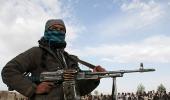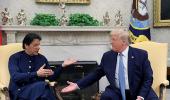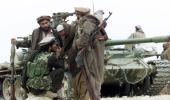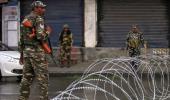'The Delhi-Washington stalemate can end only if India's concern over trans-border terrorism is addressed.'
'The Indian security establishment expects a spike in terrorist attacks in the months ahead.'
'And there is every likelihood that India may retaliate against Pakistan at some point,' observes Ambassador M K Bhadrakumar.

Colonel Sharma, commanding officer of the 21 Rashtriya Rifles, was killed along with four Indian Army soldiers and a Jammu and Kashmir policeman in an encounter with terrorists in Handwara, Kashmir, May 2, 2020. Photograph: PTI Photo
The two-hour stopover in Delhi on May 7 by the US Special Representative for Afghanistan Zalmay Khalilzad, accompanied by Lisa Curtis, the White House official in charge of South Asia, raises eyebrows.
The Indian media reported (external link) that Khalilzad came all the way to render the advice that India should get involved in the 'internal processes' in Afghanistan, and, secondly, directly engage with the Taliban.
The American side has not issued any statement on Khalilzad's mission.
A press release (external link) by the ministry of external affairs stated that Khalilzad briefed External Affairs Minister Subrahmanyam Jaishankar and National Security Advisor Ajit Kumar Doval on the status of the US-led Afghan peace process and registered Washington's appreciation of the 'constructive contribution' India is making to Afghanistan's development.
Most important, the press release conveyed that Khalilzad gently reminded ('laid importance to') Delhi of the gravity of India's 'crucial and continuing role in sustainable peace, security and stability' in Afghanistan.
The emphasis on regional peace, security and stability highlights beyond doubt Washington's concerns regarding the role India is currently playing in Afghanistan and its impact on the US's regional strategies.
Khalilzad's itinerary shows that he touched down in Delhi briefly before proceeding to Islamabad.
What it suggests is that while he had a message for India, his meeting with the ministers in Delhi would also have a bearing on his talks in Islamabad.
Meanwhile, Khalilzad also had talks with the senior Taliban leader Mullah Baradar in Doha before traveling to Delhi.
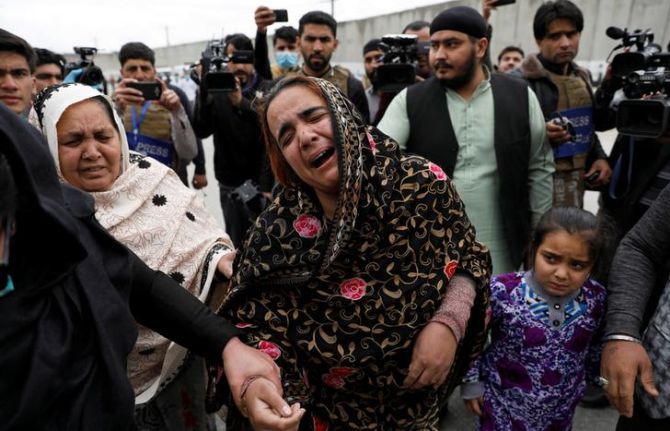
Only recently, Khalilzad had a telephone conversation with Jaishankar.
He later tweeted that their conversation on April 17 focused on the Afghan peace process.
Khalilzad added that he and Jaishankar 'talked about the urgency of resolving the internal political crisis (in Afghanistan and the importance of Afghan leaders forming an inclusive government.'
Khalilzad further wrote: 'We also discussed the need for both the Afghan government and the Taliban to accelerate prisoner releases, support a prompt reduction in violence, and start intra-Afghan negotiations. We also spent some time covering the immediate and longer-term impact of the coronavirus.'
'I told the Minister that the US welcomes Indian engagement in regional and international efforts for a lasting peace in Afghanistan. We are committed to a sustained engagement with India on this objective.'

The heart of the matter is that from the US perspective, Delhi today wields considerable influence with the Afghan elite in Kabul and can play a useful role -- if only it chooses to do so -- in nudging the Afghan government to move in a direction that galvanises the Doha pact between the US and the Taliban and in immediate terms create conditions for intra-Afghan talks.
However, Delhi harbours concerns that Afghanistan may once again become a revolving door for terrorists to bleed India.
One way out could be that India engages with the Taliban, as all other regional States have done in recent years.
The Taliban has been sending signals that it is open to contacts with India.
But Delhi tends to regard the Taliban as a mere progeny of the Pakistani military.
Arguably, Delhi needs to take a leap of faith.
But the signs are not encouraging.
Indeed, it makes no sense for Delhi to take Khalilzad's advice and talk to the Taliban without getting diplomatic participation in the US-led group navigating the Afghan peace process (which puts India in a position to secure its interests in an Afghan settlement).

Washington is cherry-picking.
The US objective is limited to bringing India's role in Afghanistan out of the shadows.
Plainly put, Indian support for the Kabul elite has become the latter's vital lifeline today, which in turn emboldens the Afghan government to push back at US pressure tactic.
Clearly, if the Afghan government didn't blink in the face of the recent US threat to cut off aid, the Indian support explained it to an extent.
India's role today weakens the US's capacity to frog-march the Afghan government to the negotiating table with the Taliban.
By getting India to move toward the middle ground -- between the Kabul elite and the Taliban -- Washington hopes to regain its lost leverage over the Afghan government.
Of course, from the Indian viewpoint, it makes eminent sense that it has forged strong links with the emergent forces of Afghan nationalism.
The reconstituted Afghan cabinet under President Ashraf Ghani has given weightage to the 'sons of the soil' instead of accommodating Washington's favourites/nominees.
Delhi's comfort level with Afghan nationalists has been traditionally appreciable.
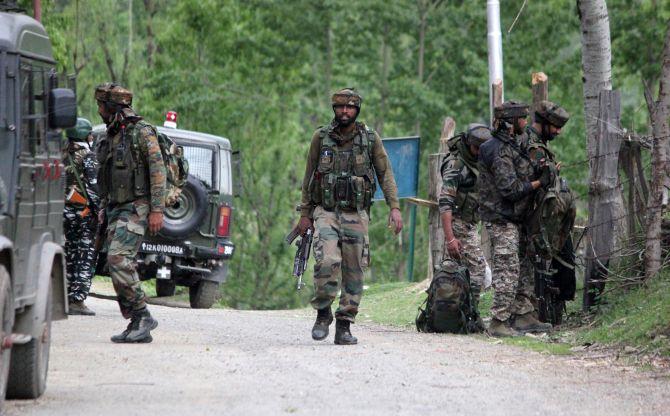
The ensuing stalemate can end only if India's legitimate concern over trans-border terrorism is addressed.
The Indian security establishment expects a spike in terrorist attacks in the months ahead.
And there is every likelihood that India may retaliate against Pakistan at some point.
If that happens, a flashpoint may well arise as had happened in February 2019, which in today's circumstances, may also deal a body blow to the US-led Afghan peace process.
There are ominous developments lately.
The killing of 5 military personnel in Handwara on May 2, 2020 highlights the criticality.
There is always the danger of a Pakistani overreach, estimating that India's hands are full, given the unprecedented challenge of a pandemic, the crashing economy and a level of societal disintegration that the country has not experienced since Independence.
Increased air activity by the Pakistan air force along India's western border has been reported.
The Pakistan army may be flaunting its nuclear capability to create a firewall to deter India while abetting militancy in J&K.
In fact, it will be a surprise if Pakistan does not exploit the mess we created ourselves in the Kashmir Valley.
Washington would have liked Delhi to harmonise its Afghan polices with the stance of its allies. But India got disillusioned with the Doha process culminating in the US-Taliban pact in February brokered by Pakistan.
Delhi has since carved out an independent pathway to secure its specific interests.
Today, with the Trump administration caught in the COVID-19 quagmire and distracted by a tough electoral battle in November, the US capacity to leverage India's Afghan policies is severely limited.
Ambassador M K Bhadrakumar served the Indian Foreign Service for more than 29 years. He has served as India's ambassador to Turkey and Uzbekistan and has been a contributor to Rediff.com for well over a decade.

